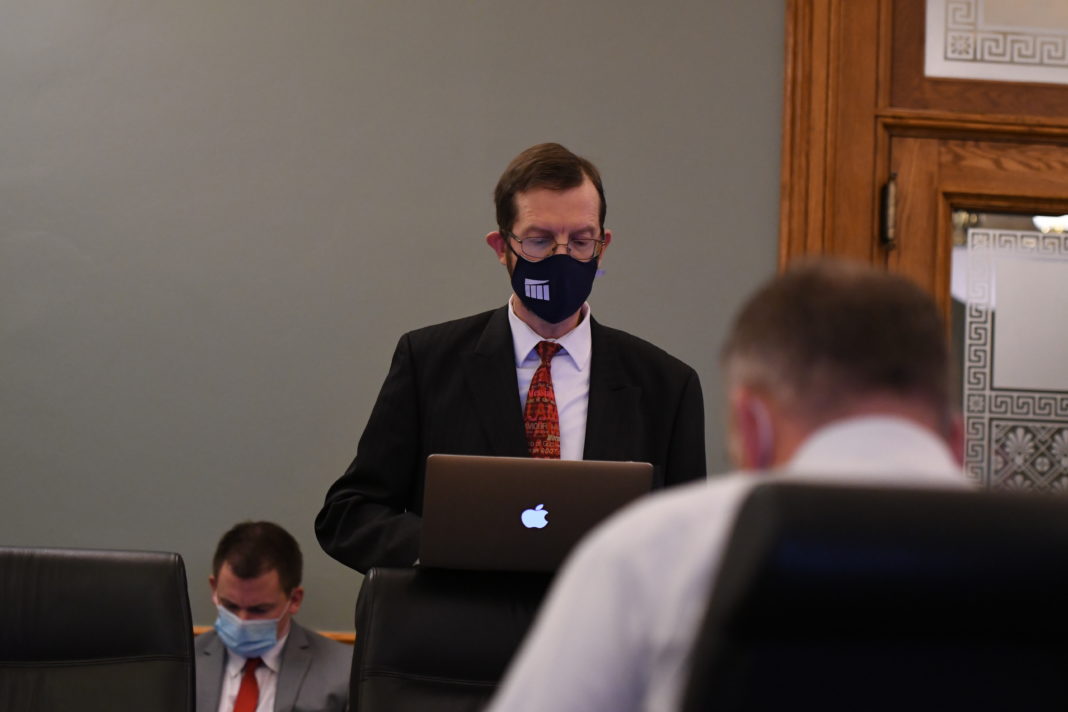House Study Bill 28 has done what many previous bills haven’t been able to do – brought plenty of groups that typically have competing interests together.
The FAMiLY Leader, Homeschool Iowa, NFIB, ABI, Americans For Prosperity, The Philanthropy Roundtable, Iowans for Tax Relief, One Iowa, GLBT Youth In Iowa Schools Taskforce (Iowa Safe Schools) and the ACLU are all lined up behind the bill.
The bill, which provides donor privacy for those who contribute to tax-exempt organizations, is likely historic in the sense of the political bedfellows it has created.
Caitlin Jarzen of the Iowa Judicial Branch suggested amending the bill to help provide protection to the courts.
Chuck Hurley of The FAMiLY Leader said the group supports the bill because those who contribute to nonprofits should have the right to privacy.
“Anonymous donations to charities are deeply engrained in our nation’s culture of giving,” Hurley said.
Humility, religious obligation, avoiding future solicitations and limiting family strife are all reasons people may want to give anonymously.
“Unfortunately, not everyone respects the privacy of charitable givers,” Hurley said.
The bill prevents government officials from “abusing their power,” Hurley said. It also prohibits disclosure of personal hands connected to a non-profit that may come into the government’s hands.
Hurley highlighted a “long and very important history” of people using donor information to get people fired or have businesses boycotted. He pointed to a 1958 decision by the Supreme Court that Alabama could not require the NAACP to turn over its membership list.
He said the case rectified “racial injustice.”
“Protecting privacy and group association is indispensable to preserve freedom of association,” Hurley said, reading from the court’s decision in the case. “Particularly where a group espouses dissident beliefs.”
Hurley said the “oppression” in Alabama was “horrific.”
Kennan Crow of One Iowa spoke in support of the bill as well. He noted the rarity of both The FAMiLY Leader and One Iowa agree.
“We believe that this bill is important enough that we’re going to put our name behind it,” he said. “Obviously when you have an issue like LGBTQ rights, it can be controversial.”
Crow said the group promises donors privacy and any attempts to disclose their information puts the group at risk of lying to their donors.
Victoria Sinclair of Iowans for Tax Relief also provided strong testimony in support of the bill. Sinclair said it is a First Amendment issue.
“Most of the groups registered on this bill participate in some of the most contentious debates of every session on all sides of the issues,” she said. “Our members donate to our organizations because they believe in our causes.”
When they donate, she said, they are expressing their First Amendment rights to freedom of association and freedom of speech.
She added that she’s not the only person speaking in favor of the bill who has been personally attacked for representing a group’s views.
“I know I’ve been chased out of this building by individuals shouting at me,” she said. “I know others who have been spat on or had to be escorted to their vehicle by state troopers to ensure their personal safety. This is an occupational hazard that we’ve all taken on to help advance the causes of our members and our donors. But our members should not have to fear for their lives for holding a view that may be unpopular at any given time. Our donors are soft targets, releasing their names and addresses at best makes them a potential target for harassment and at worse puts their personal safety in jeopardy.”
Failing to pass the legislation would have a chilling effect on free speech, she added.
“Perhaps if the supporters of equal protection under the law had been doxed during the 1950s civil rights movement, the world may look a lot different today,” Sinclair said.
Democrat State Rep. Christina Bohannan said the bill creates a whole new scheme for “this particular kind of information.”
“That gives me pause,” she said.
Bohannan talked about the Open Records law and the exemptions to that law.
This bill, she said, could create a “completely different rule” for one kind of information and she is worried about “unintended consequences.”
Republican State Rep. Steve Holt discussed the bill’s history, noting it should’ve passed with bipartisan support a couple of years ago, but a former Democrat state representative derailed the legislation.
“No one is registered against this bill,” Holt said. “You’ve got all sides of the political spectrum that are registered for this bill because they see the importance of donor privacy.”
Holt said the NAACP case referenced by Hurley convinced him of the importance of the bill. A state court said to open the records so people supporting the NAACP could be targeted.
“Don’t think it couldn’t happen today in the political environment that we are in on either side of the spectrum,” Holt said.
Both Democrats and Republicans supported the bill two years ago, but Holt said one representative tried to turn the bill into a political football and it needed to be pulled off the floor.
“This is a piece of legislation that should be bipartisan and should, in my opinion, pass with 100 yeses’ up on the board,” he said. “We need to value privacy, we need to value and understand the history and what happened in that NAACP case. That is why I green-lighted this again.”
Republican State Rep. Brian Lohse said he supports the legislation because it is important to provide safety for donors.
Holt and Lohse both signed the bill through the subcommittee process. Bohannan refused to sign off, saying she wants to take a look at the amendment proposed by the Judicial Branch.












